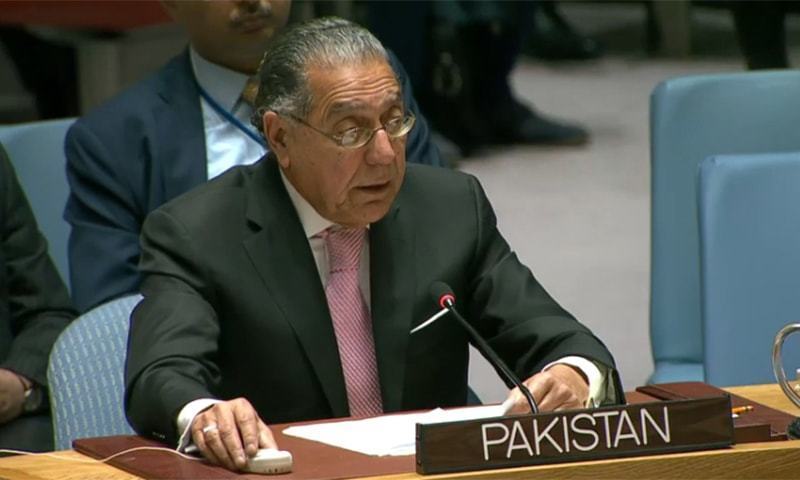UNITED NATIONS, Sep 06 (APP): Without naming India, Pakistan told the UN Security Council that “one State” appeared bent on destroying the long-running Intergovernmental Negotiations (IGN) process aimed at expanding the 15-member body, stressing: “This will prove counterproductive.”
“To serve its misplaced ambitions, one ‘State’ appears willing to destroy the IGN process, which was established by the consensus support of the entire UN membership,” Ambassador Munir Akram said, as he called for an improvement in the Security Council’s working method, the subject of Tuesday’s debate.
Since 2009, India, along with Brazil, Germany and Japan — known as G-4 — has been pushing for a permanent seat on the U.N.’s high table, a bid strongly opposed by the Italy/Pakistan-led Uniting for Consensus (UfC) group which opposes any additional permanent members.
Instead, UfC has proposed a new category of members — not permanent members — with longer duration in terms and a possibility to get re-elected.
The Security Council is currently composed of five permanent members — Britain, China, France, Russia and the United States — and 10 non-permanent members elected to two-year term.
In June, when the General Assembly rolled over the Security Council reform to the 78th session, India lashed out at the move, calling it a “wasted opportunity.” Indian Ambassador Ruchira Kamboj went on to warn that India was “looking beyond the IGN … as the only viable pathway to a future UN Security Council that would better reflect the world of today”.
At the same June meeting, Ambassador Akram, the Pakistani envoy, defended the IGN process.
Despite the divergent positions, he said, the process is the “best avenue” to accomplish a reformed Council.
“It is only through patient exchanges, mutual accommodation and compromise that we can broaden the areas of convergence and reduce the points of divergence and thus evolve a ‘model’ for the reform that can be accepted by the widest possible majority of member states,” Ambassador Akram said.
On Tuesday, in his speech on the Council’s working methods, Ambassador Akram called for openness and transparency, saying that interested non-member States should be invited to closed meetings and summary records of such meetings should be circulated to all Member States.
As well, he said, the Council should adopt guidelines to facilitate participation of non-Council members under Articles 37 and 39 of the UN Charter.
Moreover, the Council is obliged to provide timely reports on its work to the General Assembly to ensure that it acts on behalf of the entire UN membership, Ambassador Akram said, suggesting establishing a standing committee on the implementation of Council’s resolutions.
“Security Council resolutions do not have an expiry date. They must be implemented,” he emphasized.
Pointing to the dissatisfaction with sanctions regimes, he said that the Council, or failing this, the General Assembly, should commission an independent expert study to review the impact, effectiveness and relevance of those regimes.
The Council’s Counter-terrorism architecture is partial, unequal and inadequate, the Pakistani envoy said, calling for the implemntation of all four pillars of the “comprehensively and equitably.”
Since the Council appears unable to do so, he said, Pakistan has proposed that a Committee of the General Assembly be established to secure such comprehensive implementation of the GCTS ( Global Counter-Terrorism Strategy).




